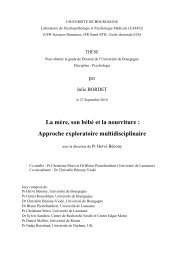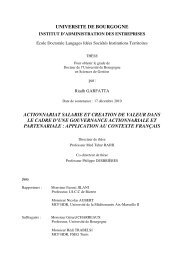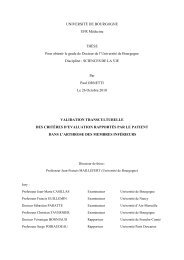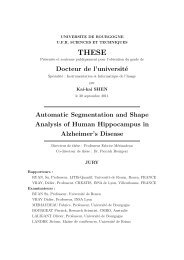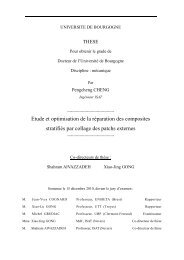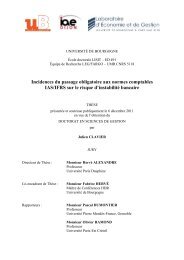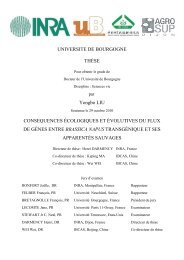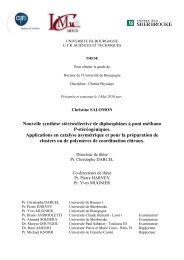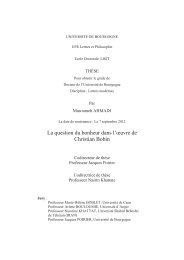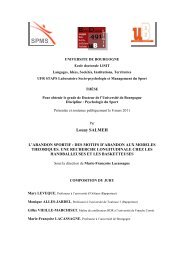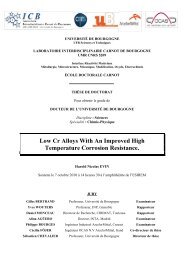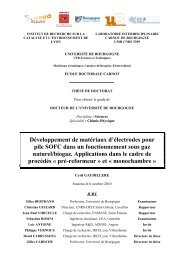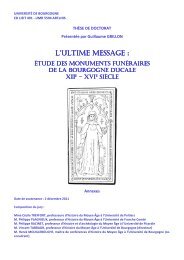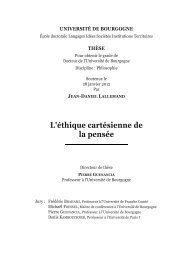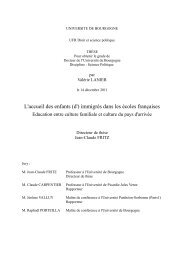Higher education in Asian countries and the role of international ...
Higher education in Asian countries and the role of international ...
Higher education in Asian countries and the role of international ...
Create successful ePaper yourself
Turn your PDF publications into a flip-book with our unique Google optimized e-Paper software.
258<br />
cooperation for implement<strong>in</strong>g <strong>the</strong> vision <strong>and</strong> strategy from a wide range <strong>of</strong> constituencies<br />
(M<strong>in</strong>gat, 2003).<br />
Ano<strong>the</strong>r report from <strong>the</strong> World Bank <strong>in</strong> year 2002, Construct<strong>in</strong>g Knowledge Societies: New<br />
Challenges for Tertiary Education. Although this report supported <strong>the</strong> Bank‟s stance on primary<br />
<strong>and</strong> secondary <strong>education</strong> but it also stressed <strong>the</strong> <strong>role</strong> higher <strong>education</strong> <strong>in</strong> capacity build<strong>in</strong>g. This<br />
report also argued that each country should mobilize its available resources to support higher<br />
<strong>education</strong> <strong>in</strong> do<strong>in</strong>g so only rate <strong>of</strong> returns to <strong>in</strong>vestment <strong>in</strong> higher <strong>education</strong> should not be<br />
focused but o<strong>the</strong>r social benefits must be consider (The World Bank, 2002).<br />
Education has a capacity to produce counter balance by transform<strong>in</strong>g raw human resource <strong>in</strong>to<br />
high valued human capital that is a prerequisite for a better utilization <strong>of</strong> o<strong>the</strong>r resources. So<br />
<strong>education</strong> <strong>in</strong> general higher <strong>education</strong> <strong>in</strong> particular acts as a fulcrum as it helps to f<strong>in</strong>d<br />
equilibrium between needs <strong>and</strong> resources. At present knowledge has become <strong>the</strong> ma<strong>in</strong> driv<strong>in</strong>g<br />
force <strong>in</strong> <strong>the</strong> development <strong>of</strong> economy so less developed <strong>countries</strong> can no longer compete through<br />
unskilled labor <strong>and</strong> simple material resources. The knowledge poverty <strong>and</strong> <strong>in</strong>novation deficit <strong>in</strong><br />
low <strong>in</strong>come <strong>countries</strong> has a negative impact on <strong>the</strong> human development <strong>in</strong>dex (HDI) that is also<br />
evident from UNDP data on HDI.<br />
“<strong>Higher</strong> <strong>education</strong> <strong>in</strong>stitutions can <strong>and</strong> do make a significant contribution to regional, economic,<br />
social <strong>and</strong> cultural development. However, failures <strong>of</strong> communication between regional<br />
stakeholders <strong>and</strong> higher <strong>education</strong> <strong>in</strong>stitutions reduce <strong>the</strong> effectiveness <strong>of</strong> <strong>the</strong>ir teach<strong>in</strong>g, research<br />
<strong>and</strong> public service efforts <strong>and</strong> limit <strong>the</strong> underst<strong>and</strong><strong>in</strong>g at <strong>the</strong> local level <strong>of</strong> <strong>the</strong>ir impact. These<br />
communication failures are <strong>of</strong>ten due to weak or unclear policy signals <strong>and</strong> conflict<strong>in</strong>g agendas”<br />
(Marmolejo & Puukka, 2006). The <strong>in</strong>stitutional culture <strong>of</strong> <strong>the</strong> Bank is <strong>in</strong>fluenced by neo-classical<br />
economics where man is considered a rational actor to maximize preferences. When this model<br />
is applied on <strong>education</strong> <strong>the</strong>n more preference is given to cognitive knowledge- science,<br />
ma<strong>the</strong>matics, communication- <strong>and</strong> little importance to aes<strong>the</strong>tic <strong>education</strong>. Similarly, due to <strong>the</strong><br />
dom<strong>in</strong>ant <strong>in</strong>fluence <strong>of</strong> human capital <strong>the</strong>ory, <strong>the</strong> Bank considers <strong>education</strong> as an <strong>in</strong>vestment <strong>in</strong><br />
<strong>the</strong> future. This <strong>in</strong>vestment results <strong>in</strong> lifetime returns both private <strong>and</strong> social returns; <strong>in</strong>come<br />
ga<strong>in</strong>, upward mobility, social status, higher productivity, better life style, good health, enhanced<br />
societal adjustment, <strong>and</strong> good governance (Lauglo, 1996). <strong>Higher</strong> <strong>education</strong> <strong>in</strong>stitutions are<br />
centers <strong>of</strong> learn<strong>in</strong>g, knowledge generation <strong>and</strong> research. The importance <strong>of</strong> research is on <strong>the</strong> rise



